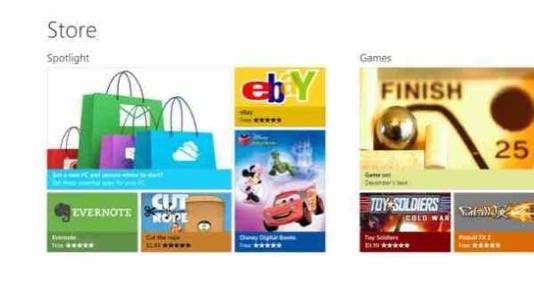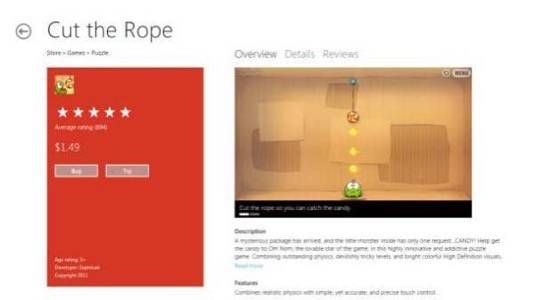
Ever since Windows 3.0, new versions of Windows have essentially been extensions of the existing platform. Windows 8 is not. It is a bold and undisguised effort to shuttle an existing user base of tens of millions from one platform to another, leaving the lights on over the Desktop so folks moving off the old platform can still see.
Yesterday’s preview of the Windows Store, Microsoft’s apps distribution system for Windows 8, is the final and most decisive indicator anyone would need that the world to which Windows users have grown accustomed is being evacuated by its proprietor. The Windows 8 beta, which the company said yesterday will premiere in late February (pretty much on schedule), and every other subsequent release, will only underscore this fact.
Key takeaways from the Windows Store preview
Last September in Anaheim, Microsoft gave the first glimpses of its Windows 8 store to developers. In terms of appearance, Windows Store (thankfully not called just “Store”) looks little changed in three months’ time. But there were some blanks at that time, and they have mostly been filled in.
Revenue sharing. Microsoft’s terms, as promised, will be fairly flat with just one “balloon” adjustment, with the developer as the benefactor. The company will take a 30% cut of revenue from sales or subscriptions from each app, with the sales price determined by the publisher and not Microsoft. However, that cut will drop to 20% after the first $25,000 generated. Expectations were for a flat one-third royalty cut across-the-board, though a few non-Microsoft folks I spoke with in Anaheim said one-third would be perceived as too high; this plan as announced should meet with their approval.
The current standard setter for app revenue distribution is Apple, whose iTunes App Store retains 30% of revenue, though that flat fee is for the lifetime of the app.
Optional transaction platforms. In September, Microsoft stopped short of revealing the prototype appearance of the mechanism it would employ to handle business transactions through the Store. At the time, it did show the authentication mechanism that so-called “Metro-style apps” would use. So the key takeaway from that demo was how it enabled alternative approaches and platforms, folks expected Microsoft to make the Store transaction mechanism similarly optional. And so it is: Vendors in the Windows Store will be permitted to utilize the transaction models of their choice, and apparently even of their own design, so long as they fulfill Microsoft’s 30%/20% requirement.

This lets publishers use their own engineering for implementing transaction “fulfillment,” as Microsoft was sure to demonstrate yesterday. Apparently templates will be provided for publishers that already have relationships with PayPal or other transaction services; and newspapers will be permitted to develop their own transaction mechanisms. This may be welcome news for publishers that have felt slighted by Apple’s stipulation that all transactions for apps made available through its App Store must be processed through iTunes.
In-app purchases will not only be permitted but encouraged. For example, if you’re viewing a Web site with Internet Explorer 10 whose content is relevant to a feature of an installed Metro app, including business transactions, the site may embed a call to that app, along with a link to the relevant content it requires to take over the process from that point. This call is then executed from a “Switch to app” button inside of the IE10 command bar, which in Metro style runs along the bottom of the screen.

This decision flies in the face of lawsuits threatened by a patent holding company against iTunes App Store publishers who have implemented in-app purchases within their own products.
Feeding the beta. In order to help populate the prototype Windows Store with Metro apps, Microsoft has launched a contest for prospective apps publishers in all categories. Developers are being given until one minute before midnight on January 8 to design and submit an app that would qualify for appearance in the Windows Store. The top 8 candidates will receive charter membership in Windows Store, along with Samsung Developer Preview PCs – the same models that were given to Build 2011 attendees earlier this year. (Who knows, you could win the same one I tested!)
Since the platform for building these contest apps is the current Developer Preview, released last September (though with patches and upgrades in the interim), it’s a safe bet that there will be no significant changes to the beta that would prevent Metro apps from running there come February. However, the “Store” that appears in the Preview today is essentially a placeholder; the transaction mechanisms – which will still be utilized even though all Preview and Beta period apps will be free – will likely have been updated with working models. So we may expect some slips and slides in the early going with respect to automated installation and apps registration. Of course, that’s why it’s called “beta.”










